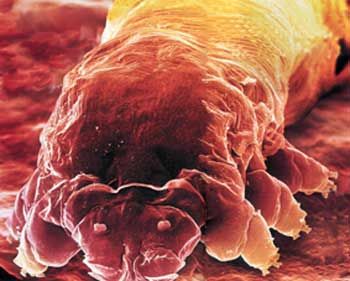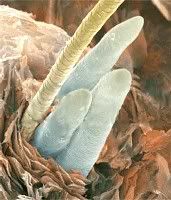Our Little Gut Buddies Are In Trouble
Bugs Inside: What Happens When the Microbes That Keep Us Healthy Disappear?
"Bacteria, viruses and fungi have been primarily cast as the villains in the battle for better human health. But a growing community of researchers is sounding the warning that many of these microscopic guests are really ancient allies.
Having evolved along with the human species, most of the miniscule beasties that live in and on us are actually helping to keep us healthy, just as our well-being promotes theirs. In fact, some researchers think of our bodies as superorganisms, rather than one organism teeming with hordes of subordinate invertebrates.
The human body has some 10 trillion human cells—but 10 times that number of microbial cells. So what happens when such an important part of our bodies goes missing?
With rapid changes in sanitation, medicine and lifestyle in the past century, some of these indigenous species are facing decline, displacement and possibly even extinction. In many of the world's larger ecosystems, scientists can predict what might happen when one of the central species is lost, but in the human microbial environment—which is still largely uncharacterized—most of these rapid changes are not yet understood. "This is the next frontier and has real significance for human health, public health and medicine," says Betsy Foxman, a professor of epidemiology at the University of Michigan (U.M.) School of Public Health in Ann Arbor.
Meanwhile, each new generation in developed countries comes into the world with fewer of these native populations. "They're actually missing some component of their microbiota that they've evolved to have," Foxman says."
I'm always on the lookout for reasons why human beings are mutating. Ever since I first saw pictures and movies of people from past generations I've been fascinated as to why we actually are starting to look like a different species, especially in western developed societies.
If you study people from say, WW2 and beyond, they appear to be proportioned much differently than people today. Diet's a big factor of course. More protein means bigger builds. I believe our foods have lost most of their nutritional value and consequently we tend to compensate by eating more to get the nourishment our bodies need. Dairy products and junk food add bulk older generations never saw.
But there's much more. Every day we're swimming in a sea of electromagnetic radiation from an increasing number of sources. The environment is far more toxic than just a few decades ago. And along with the super antibiotics this article mentions, all these things could be killing off the microorganisms that humans evolved with for millions of years. The soupy garden in our gut is changing; we're morphing into different creatures.
However there's one little hitchhiker I won't miss.

Demodex folliculorum, itsy bitsy mites with stumpy little claws that live in your pores and hair follicles, on the nose, forehead, cheek, and chin, and most of the time in the roots of your eyelashes. During the day they spend their time upside down feeding on oils in hair follicles, like these three:

At night they come out to crawl around your face and mate.
Sweet dreams.
"Bacteria, viruses and fungi have been primarily cast as the villains in the battle for better human health. But a growing community of researchers is sounding the warning that many of these microscopic guests are really ancient allies.
Having evolved along with the human species, most of the miniscule beasties that live in and on us are actually helping to keep us healthy, just as our well-being promotes theirs. In fact, some researchers think of our bodies as superorganisms, rather than one organism teeming with hordes of subordinate invertebrates.
The human body has some 10 trillion human cells—but 10 times that number of microbial cells. So what happens when such an important part of our bodies goes missing?
With rapid changes in sanitation, medicine and lifestyle in the past century, some of these indigenous species are facing decline, displacement and possibly even extinction. In many of the world's larger ecosystems, scientists can predict what might happen when one of the central species is lost, but in the human microbial environment—which is still largely uncharacterized—most of these rapid changes are not yet understood. "This is the next frontier and has real significance for human health, public health and medicine," says Betsy Foxman, a professor of epidemiology at the University of Michigan (U.M.) School of Public Health in Ann Arbor.
Meanwhile, each new generation in developed countries comes into the world with fewer of these native populations. "They're actually missing some component of their microbiota that they've evolved to have," Foxman says."
I'm always on the lookout for reasons why human beings are mutating. Ever since I first saw pictures and movies of people from past generations I've been fascinated as to why we actually are starting to look like a different species, especially in western developed societies.
If you study people from say, WW2 and beyond, they appear to be proportioned much differently than people today. Diet's a big factor of course. More protein means bigger builds. I believe our foods have lost most of their nutritional value and consequently we tend to compensate by eating more to get the nourishment our bodies need. Dairy products and junk food add bulk older generations never saw.
But there's much more. Every day we're swimming in a sea of electromagnetic radiation from an increasing number of sources. The environment is far more toxic than just a few decades ago. And along with the super antibiotics this article mentions, all these things could be killing off the microorganisms that humans evolved with for millions of years. The soupy garden in our gut is changing; we're morphing into different creatures.
However there's one little hitchhiker I won't miss.

Demodex folliculorum, itsy bitsy mites with stumpy little claws that live in your pores and hair follicles, on the nose, forehead, cheek, and chin, and most of the time in the roots of your eyelashes. During the day they spend their time upside down feeding on oils in hair follicles, like these three:

At night they come out to crawl around your face and mate.
Sweet dreams.





4 Comments:
unfortunately, those mites are likely to take over once the commensal bacteria are wiped out!
You're right, some of those buggers are positively indestructable.
We have noticed that you have two of our copyrighted images on your website. We have not given you permission to use these images and would respectfully ask you to remove them immediately. A licence fee has to be paid to use a copyrighted image especially on a commercial website and it is also customary and good manners to credit the copyright holder.
The images in question are the two Demodex folliculorum or eyelash mite pictures. Cheryl Power PSmicrographs
lol.....
Post a Comment
<< Home